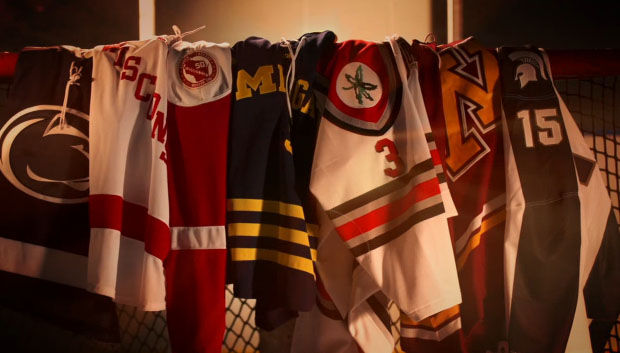BTN.com staff, September 16, 2013
The puck is about to drop on the inaugural Big Ten hockey season, so BTN.com's Jeremy Woo takes a look at the programs' greatest moments. Relive the top feats for Michigan, Michigan State, Minnesota, Ohio State and Wisconsin in this post. Where's Penn State? The program makes its varsity debut this season, and it's only a matter of time before it creates moments of its own.
[ MORE: BTN/BTN2Go to air 27 hockey games this season ]
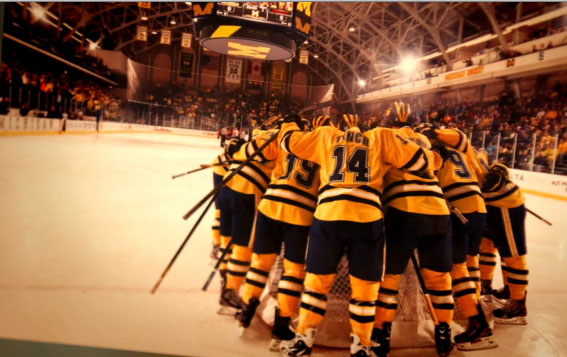
MICHIGAN
1. March 30, 1996
Thirty-two years.
For all its rich history, Michigan had gone three-plus decades without a national title. The Wolverines were back again, facing Colorado College with another chance to end that drought. When Brendan Morrison came up with a huge goal in overtime, things finally felt right.
Morrison?s goal carried extra weight-the Wolverines had literally been on the other end of the stick three years in a row. They?d lost in extra time in consecutive finals to Maine (1993), Lake Superior (?94), and Maine (?95) again. In the most recent final, Morrison?s double overtime shot attempt rebounded excruciatingly off the post.
Bill Muckalt scored in the first for the Wolverines, who came back from a 2-1 deficit entering the final period. Goaltender Marty Turco made 21 saves and Mike Legg scored a critical tying goal in the third period to send the game into extra time, and in dramatic fashion, Morrison (who was named Most Outstanding Player) ended the streak three and a half minutes in. This time around, he didn?t think twice, bagging one off a rebound to wrap up the eighth title in school history.
Michigan hockey was back.
[ MGoBlue.com: Michigan hockey history (PDF) ]
2. April 4, 1998
The Wolverines? most recent national championship reflected a season that, despite its successes (their record stood at 33-11-1 to that point) had come with some disappointment. They had finished second in the conference (by a point) and fell to Ohio State in the second round of the CCHA playoffs. They lost to conference champion Michigan State four times on the year. But behind goaltender Marty Turco, Michigan was back in familiar territory, sniffing the trophy once more.
The Wolverines and Eagles traded goals in regulation, as Michigan freshman Mike Kosick tied the game twice with goals in the second and third periods. Turco made 28 saves and helped keep his team in the game. And in overtime, it was Josh Langfeld who beat BC?s Scott Clemmensen short-side, finding a tiny opening and the back of the net to finish it.
That year, Turco set NCAA records for career wins (127, which still stands) and shutouts (15, later surpassed by Michigan State?s Ryan Miller). He was named to the all-tournament team along with Kosick, Langfeld and defenseman Bubba Berenzweig. It was a true ensemble victory from the Wolverines, who brought their ninth title back to Ann Arbor.
3. March 14, 1953
Michigan faced off against Minnesota in the NCAA final with the opportunity for its third straight title, and fourth in the past six years. But a program in midst of an extraordinarily successful run wasn?t even favored.
Though the finals had become familiar territory, the Wolverines weren?t supposed to be back. Two weeks prior, they were tournament longshots. Under head coach Vic Heygliger, they had rallied and hit a strong run of form to return to the championship-but they would face a Gophers team on a 10-game winning streak and a 23-5 record.
Despite an early Michigan goal, Minnesota controlled the first period, going ahead 2-1 after 20 minutes. But the floodgates began to open in the second period, as Michigan?s Doug Philpott struck at 6:15 to tie-the first of what would be five straight Wolverine goals. Doug Mullen put the Maize and Blue up at 11:34 to take the lead, and the defense valiantly staved off four second-period Minnesota power plays.
The game opened up in the third, and Michigan added four more goals, going on to a 7-3 victory that would complete their three-peat, cementing the 1950s dynasty. They would win it twice more, in 1955 and 1956, making it five titles in six years.
Honorable Mention: March 24, 1996 – Mike Legg?s ?Lacrosse Goal?
In one fluid motion, Mike Legg scored one of the more innovative goals in the history of hockey. He stood behind the net, cradled the puck onto his stick and swiftly skated to the front of the net, where he dumped it into the net faster than anyone could react. The goal, scored against Minnesota in the 1996 West Regional, tied the game and gave Michigan new life.
Michigan would go on to win the title, anchored by Legg?s penchant for finding net. He would take home an ESPY for ?Outrageous Play of the Year? for the goal, and memorably go down in Michigan history for his stroke of brilliance.
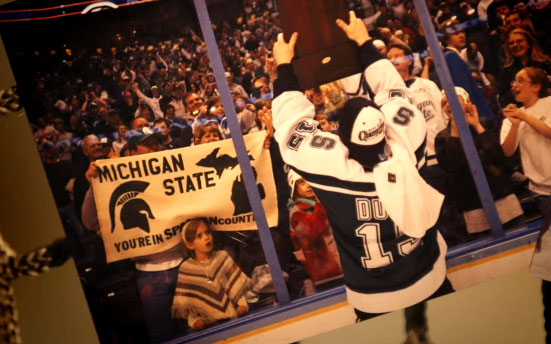
MICHIGAN STATE
1. March 29, 1986
Legendary head coach Ron Mason led his Spartans into the NCAA final against Harvard to put the icing on a fairy-tale of a season. A memorable, fun-loving group of players, led by senior left wing Mike Donnelly, the NCAA?s leading goal scorer (who set a record that year with 59), hoped to make up for the previous year?s disappointing early playoff exit.
A team nobody expected to contend, one year removed from 38 wins and without six of its top seven scorers from that team, had come together in astonishing fashion. ?These kids aren?t smart enough to realize they can lose,? Mason told Sports Illustrated.
And lose, they didn?t–but in the final, they came close. The Crimson jumped out to a 2-0 lead, however Michigan State rallied in the second and trailed just 4-3 entering the final period. The Spartans scored two quick goals in the first two minutes of the third off the sticks of freshmen Brad Hamilton and Brian McReynolds to go ahead. The lead was brief, though, as Harvard?s Andy Janfaza equalized just one minute later.
With under three minutes to go, it was Donnelly who played the hero. His incredible 59th goal of the season and second of the game sealed Michigan State?s second NCAA title, the only one they would win under Mason. The Spartans–maybe a year late, maybe not–finally took home the hardware.
2. April 7, 2007
The Spartans entered the final period of the 2007 NCAA final down, 1-0, to favored Boston College. They left it as champions.
The Eagles, in midst of a 13-game win streak, notched a second-period goal courtesy of Brian Boyle to go up 1-0. Midway through the third period, Tim Kennedy broke through for Michigan State on a power play goal off a faceoff, his fifth score in the last seven games. The game remained tied entering the final minute, seemingly bound for overtime.
But it was Kennedy again who worked his magic, this time in the game?s final seconds. Spinning away from his defender behind the net, he dumped the puck toward the front of the net. He found Justin Abdelkader, who knocked it home off the post to put the Spartans up for good with 18.1 seconds remaining. An empty netter from Chris Mueller with a second left made it 3-1, and behind 29 saves from goaltender Jeff Lerg, Michigan State took home its third national title in dramatic fashion.
3. March 18, 1994
The Spartans entered storied Joe Louis Arena, home of the Detroit Red Wings, with a couple sets of stakes on the line. On the other side of the ice stood the Bowling Green Falcons, who Michigan State would battle in the CCHA tournament quarterfinals. But the other storyline saw Spartans head coach Ron Mason battling his former school and hoping to become the winningest coach in college hockey history.
Mason sat on an astonishing 697 victories, tied with his mentor, former University of Alberta coach Clare Drake. With a win, he?d surpass Drake and the Spartans would advance in the tournament-more than enough motivation for the Michigan State camp. But things didn?t start off the way it planned.
Bowling Green built a 2-0 lead and held it until about 10 minutes remained in the final period. Then, Steve Guolla happened. The junior forward notched two goals in the game?s final stages to tie it up and send things to overtime. In the extra period, Guolla struck once again for the win, ending Bowling Green?s season, moving the Spartans on to the next round and giving Mason his remarkable record.
Interestingly, across the bench from Mason sat Bowling Green head coach Jerry York, the man who years later would break Mason?s eventual career record of 924 wins as head coach at Boston College.
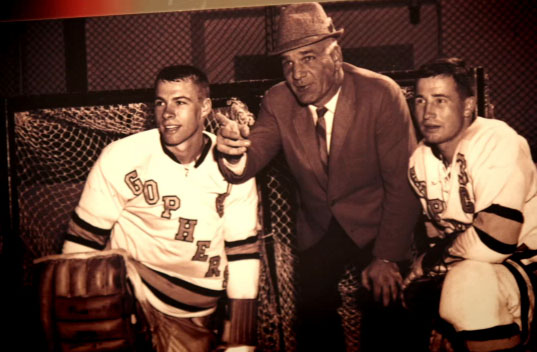
MINNESOTA
1. April 6, 2002
In front of 19,324 people at Xcel Energy Center–making for the largest crowd to ever witness a hockey game in the state of Minnesota–the Gophers squared off with the Maine Black Bears for their fourth modern-era NCAA Championship, and first in 23 long years.
Minnesota defenseman Keith Ballard opened the scoring with the first period?s lone goal, and the two teams traded goals before Maine's Robert Liscak scored the go-ahead goal with 4:33 to go in the third period. That put the pressure squarely on the Gophers, and they answered.
In the final minute, head coach Don Lucia pulled goalie Adam Hauser, going all-in for the tie. Forward Matt Koalska came through, tying it with 52.4 seconds left in regulation and sending the contest to overtime. And after a Maine tripping penalty 16 minutes in, Minnesota?s Grant Potulny struck the final blow on the power play.
Senior captains Pohl (who had the game-winning assist, his second of the game) and Jordan Leopond were named All-Americans, with Leopold more notably taking home the Hobey Baker award. Pohl?s 27 goals and 52 assists led the nation in scoring, while Leopold?s 20 goals broke Minnesota?s single-season record for goals by a defenseman. Hauser recorded 36 saves, cementing his school record total at 3,777. The Gophers finished 32-8-4 to cap off a memorable year and return to the biggest spotlight of all.
2. March 23, 1979
The Gophers took on WCHA rivals and No. 1 ranked North Dakota Fighting Sioux for the NCAA title. Legendary coach Herb Brooks manned the bench, aiming for his third title in seven years at Minnesota. Olympia Stadium was packed as the two powerhouse programs prepared to duke it out.
Minnesota skated to a 3-1 lead behind goals from Steve Christoff, John Meredith and team captain Bill Baker, which led to a goalie switch from its opponent. The skillful Gophers were firing on all cylinders, ready to claim their third title.
But the Sioux dominated the second period behind a strong performance from goaltender Bob Iwabuchi. The freshman saved all eight Gopher shots in the period, and teammate Kevin Maxwell broke through with 1:58 remaining to bring the score to 3-2, as momentum shifted. Maxwell?s goal was a bit of a fluke-banking off the back of Gopher goaltender Steve Janaszak?s skate.
Minnesota?s Neal Broten gave the Gophers some breathing room with a crazy goal 2:48 into the third. Broten beat his defender, and as he tripped to the ice, offered up a one-handed, mid-air chip shot that eluded Iwabuchi and brought it to 4-2. The impromptu stroke of brilliance gave the Gophers a comfortable cushion. But 17 minutes remained, and the Sioux weren?t about to give up. With 9:56 left, North Dakota?s Marc Chorney hit one in from the left point, setting up a dramatic finish.
Eventual Most Outstanding Player Janaszak stoned several late North Dakota attempts to cement the victory. Bill Baker was named a First Team All-American and Christoff, Eric Strobel and Mike Ramsey were named to the All-Tournament team with Janaszak. The Gophers finished 32-11-1 to complete a memorable season, Brooks? last with the team as he would head off to coach the U.S. Olympic Squad for the 1980 games-a team that would include nine of his former Minnesota players.
3. March 17, 2007
The great Minnesota-North Dakota rivalry was staged this time at the WCHA tournament finals. Second-ranked Minnesota, the regular season champs, hoped to double their dominance with a victory. North Dakota ranked seventh, having gone 15-2-4 in the second half of its campaign, and was sure to pose a challenge.
An unusually large collection of NHL talent hit the ice that night, with seven Minnesota players going on to pro careers and North Dakota dressing nine future members that night. Names including Blake Wheeler, Erik Johnson and Kyle Okposo lined up as Gophers across from North Dakota stars Jonathan Toews and T.J. Oshie, among others. With plenty of quality up and down both rosters, the game was sure to be a memorable one.
A rough first period that included nine penalties between the two sides went scoreless, with goaltenders Jean-Philippe Lamoreaux of UND and Minnesota?s Jeff Frazee ably minding the nets, saving 10 shots apiece. Gopher Erik Johnson netted the game?s first goal eight minutes into the second period, which North Dakota?s Taylor Chorney answered shortly afterward, taking advantage of a 5-on-3 power play. Minnesota?s Ben Gordon broke the tie at the 15:36 mark to make it 2-1 in favor of the Gophers entering the third.
Just under two minutes into the last period, Ryan Duncan tied it up for the Fighting Sioux with a quick power-play goal from the right side, his 30th of the season. But from there, the Gophers locked things down, controlling the puck and mounting several attacks on goal. North Dakota was more than prepared, stifling Minnesota and sending things to extra time.
Then, Blake Wheeler happened. About three minutes into the extra period, Chorney turned the puck over in North Dakota?s offensive zone. Minnesota?s Jay Barriball recovered and sent a long pass across the ice to a streaking Wheeler. As the puck banked off the boards, the sophomore forward chased it down with a defender in tow. In a masterstroke, Wheeler laid out for the puck and stretched with his left hand, chipping it up?and over Lamoreaux, somehow landing in the net.
The circus goal cemented one of Minnesota?s most unexpected and thrilling finishes ever. After the game, Wheeler claimed to have no idea the shot had gone in as he slid into the boards. Fittingly, Wheeler was named MVP of the tournament and Mike Vannelli joined him on the All-Tournament team.
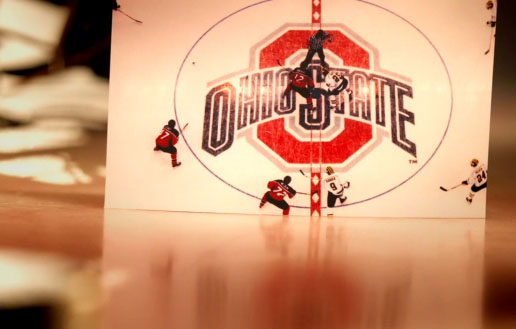
OHIO STATE
April 2, 1998
The stakes were as high as ever. Ohio State was one game away from their first Frozen Four appearance, and the top-seeded Michigan State Spartans stood between the Buckeyes and history. Ohio State had lost to it rival in double overtime just a week earlier in the CCHA championship game and were 1-3 against their favored opponents on the season.
A back-and-forth game saw the Spartans get off to a 2-0 lead. Buckeye goals from Andre Signoretti and Hugo Boisvert brought the game back to a deadlock. Another Michigan State goal late in the second period, its third power-play goal of the game, put the Spartans up 3-2.
But late in the third period, Ohio State?s Neal Rech knotted it up off a rebound from Tyler McMillan?s hard shot from distance, beating Michigan State goalie Chad Alban on the second chance. Alban stuffed a late Ohio State breakaway to keep it even and send the game to overtime.
After two near-goals from the Spartans, Ohio State got the puck on the counterattack. Boisvert took it up the ice, giving it up to Eric Meloche on the left wing. His attempt to center the puck was poked away by Alban, but landed at the stick of Signoretti at the bottom of the opposite faceoff circle. With 8:47 remaining in the game, the talented freshman slapped it past Alban?s stick for his second goal of the game. The win sent Ohio State to the NCAA Finals for the first time in school history as champions of the West region.
2. March 20, 2004
As the Buckeyes suited up for the CCHA tournament championship against two-time defending champion Michigan, their third game in three days, adrenaline ran high. Ohio State looked to claim its first league title since 1972, and had battled through two tough matchups to get there.
Ohio State hadn?t led in regulation the entire tournament. A quarterfinal match with Notre Dame resulted in a close-fought 6-5 overtime win, with a game-winning goal from Tyson Strachan. The Buckeyes rallied from behind once more - erasing three different one-goal defecits - in the semis against in-state foe Miami University, this time prevailing 4-3 in overtime. JB Bittner won the game and kept Ohio State alive with a goal just 23 seconds into overtime.
The come-from-behind trend ended in the final. Goals from tournament MVP Paul Caponigiri, two from Doug Andress and another from Dan Knapp led the Buckeyes to a 4-2 win and the conference championship. Ohio State became the first team from outside the state of Michigan to win the conference since 1988. Goalie Doug Caruso turned in a strong night, saving 26 Wolverine shots to preserve victory and a second-consecutive berth in the NCAA tournament.
3. January 2, 1999
As a snowstorm descended on Columbus, things heated up inside the Schottstein Center as Ohio State took on archrival Michigan in its first ever game at brand-new Value City Arena. A crowd of 17,045 took shelter from the weather to watch the Buckeyes break in their new home in a nationally-televised game, the third-largest crowd ever to fill the stadium.
The home team didn?t disappoint, bringing home a dramatic 1-0 victory behind Chris Richards? dazzling slapshot goal and an impressive shutout by goalie Jeff Maund. The energy in the state-of-the-art facility made for an exciting atmosphere, and helped to usher in a new era of Ohio State hockey.
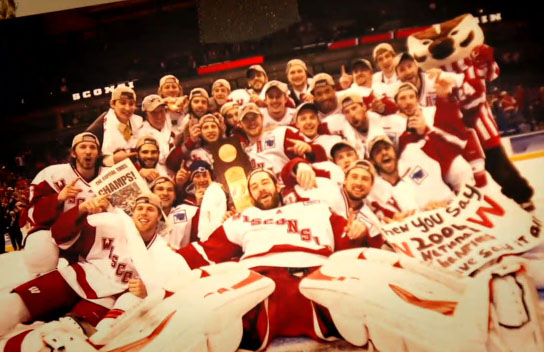
WISCONSIN
March 26, 1977
Wisconsin?s season had been nothing short of impressive. It had captured the WHCA title. It had placed first in the unofficial Big Ten standings. It had won 36 games to date. The Badgers entered Olympia Stadium looking for not only their 37th victory, but their second NCAA title. Standing in their way was always-formidable Michigan.
Under legendary head coach ?Badger? Bob Johnson, who memorably donned a red cowboy hat that night, Wisconsin fielded an outstanding side in its own right. Led by forwards Mike Eaves and Bob?s son, Mark Johnson (whose 36 goals that year as a freshman remain a record) along with defenseman Craig Norwich and goaltender Julian Baretta, the Badgers rolled through the playoffs, with an overtime goal from Eaves in the semifinal against New Hampshire bringing them to the title game. And once again, they didn?t disappoint.
Wisconsin got out to a 3-0 lead in the first period, but the Wolverines battled back with two of their own-it was clear both teams were in for a fight. Mark Johnson?s second goal of the game, 1:10 into the third period, gave the Badgers a seemingly comfortable 5-2 lead. But a furious Michigan attack managed three unanswered goals-two of them within two minutes of Johnson?s-to force overtime. Things weren?t looking good.
Battling physical and mental fatigue, Wisconsin had seemingly lost the momentum. But just 23 seconds into overtime, the Badgers made their final statement of the season. Mike Eaves won a faceoff, which was gathered along the boards by teammate Tom Ulseth. Ulseth?s point-blank shot attempt led to a series of Wisconsin attempts, parried by Michigan goalie Rick Palmer until Steve Alley finally banged one in, finding the net through a cluster of bodies, to end it. Wisconsin?s dream season ended on the highest possible note, 6-5. Baretta was named the tournament MVP and an All-American along with Eaves and Norwich.
April 8, 2006
Searching for their sixth NCAA title, the first since 1990 as well as under head coach Mark Eaves, the Badgers took on Boston College at the geographically convenient Bradley Center. Boasting a 29-10-3 record, Wisconsin hoped to put a major exclamation point on the year with a 30th win.
Boston College?s Pat Gannon opened the scoring midway through the first period in what was a largely defensive battle, with both goaltenders performing impressively under pressure. Wisconsin?s Robbie Earl finally broke through 1:17 into the second to tie it 1-1. BC?s Cory Schneider turned away shot after shot, and would finish with 37 saves.
Both sides had successfully killed the power-play until Wisconsin?s Tom Gilbert wristed one home off an assist from Joe Pavelski nine minutes into the final period. Despite a barrage of shots from the Eagles, the 2-1 Badger lead would hold, behind impressive play from goaltender Brian Elliott (22 saves) and a little luck, as one BC shot rattled frighteningly off the post. The Badgers would take home the championship once again.
Wisconsin managed not to allow a single power-play goal in the entire NCAA tournament, holding opponents 0-16. Earl was named the tournament?s Most Outstanding Player, while Elliott, Gilbert and forward Adam Burish joined him on the All-Frozen Four team.
March 5, 1983
On the way to the WCHA playoff championship and eventual fourth NCAA title, the Badgers took part in one of the more epic and memorable games in their history. The semifinal pitted Wisconsin against North Dakota, and it would take three overtimes to settle the score in the longest game in Badger history.
Swapping goals, an exciting back-and-forth contest had come down to the wire, as Wisconsin trailed 5-4 in the final seconds of the game. Sophomore defenseman and future Hall of Famer Chris Chelios came through in the clutch, scoring with just 12 seconds left to tie it.
One overtime passed, scoreless. Then two. And in the third extra period, it was sophomore forward Paul Houck, who led the team with 71 points that year, who put the game to rest on a shorthanded goal. In head coach Jeff Sauer?s first year, it was just one of many impressive victories on the road to the national championship by a team that had also lost its three leading scorers from the previous year.







